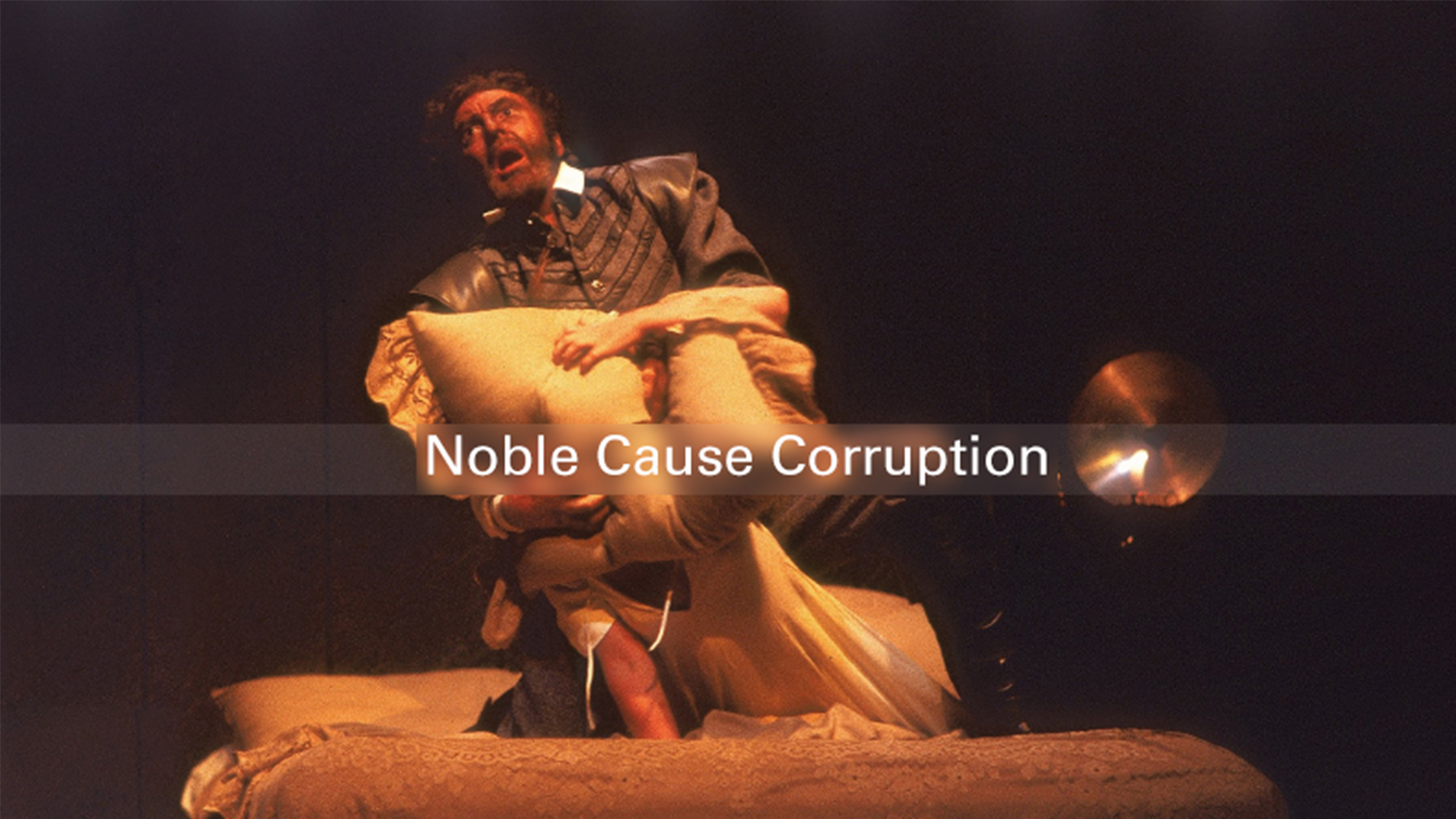
Copyright © 2020 ELSL. All rights reserved
Duplication, distribution and/or adaption of any part of the work without the written permission of ELSL is a punishable offence under the Intellectual Property Act, No. 36 of 2003. (Sri Lanka)
Noble cause corruption in Shakespeare’s “Othello”
Introduction
William Shakespeare’s tragic play, Othello, presents a compelling exploration of noble cause corruption, a form of corruption fueled by adherence to a teleological ethical system called consequentialism. This phenomenon arises when individuals firmly believe in the righteousness of their actions, leading them to employ unethical or illegal means to achieve perceived desirable outcomes for the greater good. Othello, the esteemed Moorish general in the Venetian army, personifies this complex concept as he grapples with a moral dilemma that ultimately results in his tragic downfall. Through Othello’s mindset and attitudes towards English law, which are intertwined with Christian doctrines on marriage, Shakespeare offers a socio-political criticism of his time, highlighting the importance of administrative accountability, moral leadership, and a just criminal justice system.
Dirty Harry Syndrome and Othello
The phenomenon of noble cause corruption in Othello can also be likened to the “Dirty Harry Syndrome,” a term used to describe situations where individuals, like the iconic fictional detective Harry Callahan from the Dirty Harry film series, employ questionable or morally ambiguous methods to achieve what they perceive as necessary and just ends. In the case of Othello, his conviction in the righteousness of his cause, combined with his perception of imminent harm to Venice, compels him to take extreme measures, akin to the Dirty Harry Syndrome, to prevent potential betrayal and safeguard the societal order.
The Conditions Predisposing Noble Cause Corruption
Instances of noble cause corruption tend to manifest in environments where individuals perceive a lack of administrative accountability, experience a decline in morale, and endure weak leadership. Furthermore, a loss of faith in the efficacy of the criminal justice system can exacerbate these conditions. Additionally, factors such as arrogance and insufficient supervision can further contribute to the proliferation of noble cause corruption within a given context.
Othello's Character and Mindset
As a highly esteemed military leader of the Venetian army, Othello occupies a position of substantial authority and autonomy in the realm of military affairs. This elevated status imbues him with a sense of self-assuredness in his decisions and actions, resulting in a diminished sense of administrative accountability. Consequently, Othello’s moral convictions and commitment to upholding the integrity of Venetian society become increasingly pronounced.
The Influence of English Law and Christian Doctrines on Marriage
In the backdrop of Shakespeare’s time, English law was profoundly influenced by Christian doctrines, particularly in regard to marriage. Marriage was held sacrosanct, with any perceived infidelity regarded as a grave affront to both divine ordinances and societal norms. Othello’s moral compass aligns closely with these prevailing beliefs, leading him to ardently defend the sanctity of marriage and uphold the principles governing Venetian society.
Othello's Erosion of Faith in the Criminal Justice System
As the plot unfolds, Othello’s unwavering faith in the criminal justice system begins to erode. Exploiting this vulnerability, Iago, a cunning manipulator, sows seeds of doubt in Othello’s mind concerning Desdemona’s fidelity. This newfound suspicion leads Othello to question the efficacy of the judicial system in delivering impartial justice. Consequently, Othello contemplates taking matters into his own hands to safeguard the sanctity of marriage and preserve the moral fabric of Venetian society.
Arrogance and Weak Supervision of Othello
Othello’s position of leadership and authority fosters a sense of invincibility and entitlement, leading to a degree of arrogance. This arrogance, coupled with inadequate supervision, renders Othello susceptible to Iago’s insidious manipulation. Blinded by his self-righteousness, Othello becomes resolute in his belief that he alone possesses the truth and that his actions are morally justified.
Othello's Soliloquy in Act 5, Scene 2
“It is the cause, it is the cause, my soul,–
Let me not name it to you, you chaste stars!–
It is the cause. Yet I’ll not shed her blood;
Nor scar that whiter skin of hers than snow,
And smooth as monumental alabaster.
Yet she must die, else she’ll betray more men.”
In this poignant soliloquy, Othello wrestles with the conflict between his love for Desdemona and his perceived duty to protect Venice from potential betrayal. He is convinced that Desdemona’s death is necessary to prevent her from causing further harm to other men through her supposed infidelity. This quote exemplifies Othello’s noble cause corruption as he rationalises his actions, blinded by his sense of righteousness.
Shakespeare's Socio-Political Criticism
In employing Othello as a representative of noble cause corruption, Shakespeare subtly critiques the socio-political climate of his era. The play was composed during the Elizabethan period, a time marked by challenges related to race, religion, and governance. Through Othello’s tragic descent into corruption, Shakespeare raises pertinent questions concerning the nature of power, leadership, and justice within society.
Conclusion
Shakespeare’s Othello serves as a profound commentary on the ramifications of noble cause corruption and its correlation with power, morality, and the criminal justice system. By analysing Othello’s mindset and attitudes towards English law and marriage, we gain invaluable insights into the complexities of human nature and the perils of unchecked noble cause corruption. The play stands as an enduring reminder of the imperatives of administrative accountability, moral leadership, and a just legal system within any society. Moreover, it serves as a timeless critique of the socio-political dynamics prevalent in Shakespeare’s era, continuing to resonate with contemporary audiences due to its incisive exploration of the human psyche.
